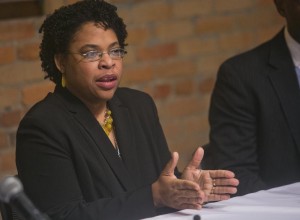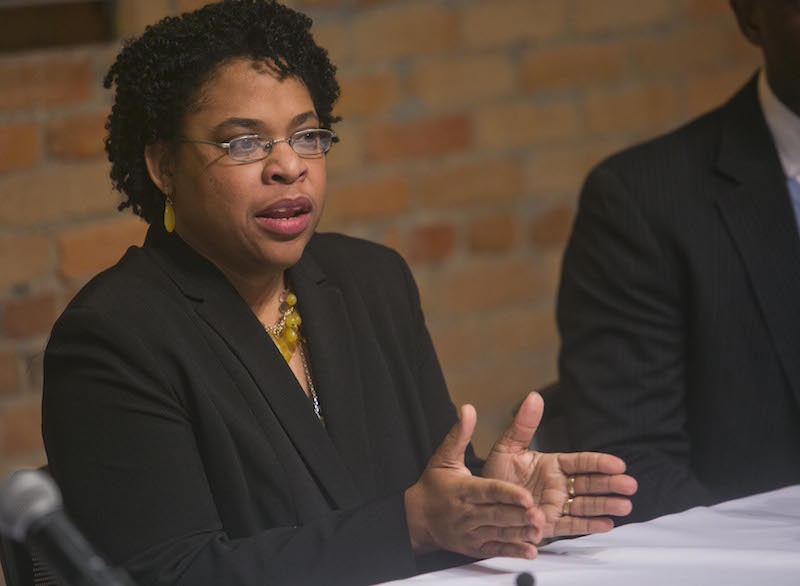
Jennifer Pinckney, widow of the pastor Rev. Clementa C. Pinckney, during the Reflections on Charleston press conference at the Franklin Humanities Institute at Duke University
In a packed Page Auditorium on Duke University’s West campus, a distinguished older gentleman stood to speak.
On stage was Jennifer Pinckney, the widow of Charleston Rev. Clementa C. Pinckney, shot by a racist on June 17, 2015. Pinckney, a state senator, was leading bible study at Mother Emanuel AME Church. With him died eight other parishioners.
Mrs. Pinckney was joined by close friends Chris Vaughn and Kylon Middleton, South Carolina pastors who were also her husband’s colleagues and friends.
The gentleman seemed to speak for every one of the 1,000 people gathered that cold February night. From New Orleans, the speaker talked about the hatred that gave rise to the Charleston murders. But he wanted us to know that this was not some isolated incident. He spoke of the hatred that continues to be stirred up in the course of our politics, in particular against African Americans, Mexicans, women and Muslims.
“When are we going to sound the alarm?” he asked.
The question was at once specific and terrifyingly broad. How is it that our country created a disaffected young man capable of slaughtering people who welcomed him to their place of worship? Investigators say the shooter chose this specific church because of its deep history of social justice for African-Americans. The African Methodist Episcopal (AME) Church was founded in 1816 in Philadelphia, after black worshippers split from the white-dominated churches where they experienced violent discrimination.
In 1800s Charleston, devout families were arrested and their leaders whipped for belonging to AME churches. In the Triangle, there are over a dozen of them. A former AME church, St. Joseph’s, now houses the Hayti Heritage Center in Durham, on the National Register of Historic Places.
But the gentleman’s question went far beyond a single, horrendous incident. The level of invective in our politics, on line and in our daily life sometimes seems limitless. Especially on the Republican side, debates share more with Worldwide Wrestling matches than a discussion of proposals to made us a stronger nation. Each question is either a gotcha moment (body slam) or an insult fest. We’ll annihilate our enemies or, in the words of one candidate, “carpet bomb” men, women and children to find out whether “sand can glow in the dark.”
On the Democratic side, the invective is usually mild. Debates are substantive and, for the most part, issue-based. Yet there’s a distinct whiff of insult in the suggestion that the supporters of one candidate are Wall Street sealed-and-delivered while the others are wild-eyed fantasists incapable of rational thought.
When are we going to sound the alarm?
I’m not religious, but I couldn’t help but be stirred by Rev. Middleton’s invocation of Job. The faithful do not follow God because life is easy, he told us, but precisely because life is hard. Life tests and breaks us all and in that testing and breaking we find our shared humanity. Sometimes, I feel like every morning is a test – more children drowned off a Greek shore, more bombs on Syrian hospitals, more shooters in churches, schools and stores.
Sometimes, I hear the shots in the night. I fear for that family. Sometimes, the shots are too far away, but the morning’s paper brings them to me along with reports of the night’s carnage. It seems like we’ve lost fellow feeling, the assurance that we are all fragile. None of us is getting out of our solar system alive.
A friend recently shared with me a poem by the late Stanley Kunitz. A U.S. Poet Laureate who lived to be 100, Kunitz was a writer of incantatory power. He once said that poems came to him in the form of a blessing, “like rapture breaking on the mind.”
For me poetry is a kind of religion, where I find solace. In Kunitz’s “The Testing-Tree,” a boy walks home from school. The beauty and variety of the natural world absorbs him. The boy imagines himself as a hero of old and arms himself with three rocks to pelt against the Testing-Tree, an “inexhaustible oak/tyrant and target, Jehovah of acorns.”
Suddenly, the boy slips into a dream. Through this simulation of war, the boy glimpses his mother’s mortality and then his own. “In a murderous time,” Kunitz writes, “the heart breaks and breaks/and lives by breaking. It is necessary to go/through dark and deeper dark/and not to turn.”
That night, as Mrs. Pinckney talked about her lovely daughters, as words of comfort and concern passed between us, my heart broke. I fear over the next months, things will get worse. The dark will deepen. My heart will break a little more.
And who will sound the alarm?
The video of the public event is available below.

